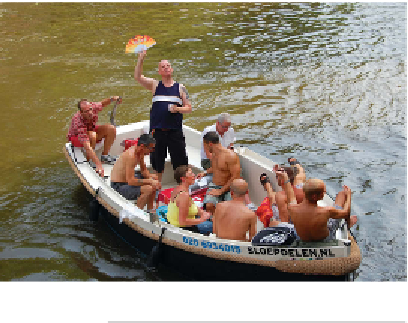Travel Reference
In-Depth Information
and willingly make roughly 25 per-
cent less money. While this may not
be good for business, it is good for
life. Choosing to work less is part of
“family values” in Europe; meanwhile,
here in business-friendly America,
working less is frowned upon…almost
subversive.
A Greek friend of mine spent
twenty years working in New York.
Only after he retired and returned
to Greece did he realize that not once
in all those years in America did he take a nap. Back in Greece, if he's sleepy
in the afternoon, he takes a snooze. Europeans marvel at how Americans
seem willing, almost eager, to work themselves into an early grave. In many
countries, European friends have told me proudly, “We don't live to work…
we work to live.”
Europeans understand the trade-of . Because they choose to work less,
most Europeans don't strive for the material al uence that their American
counterparts do. European housing, cars, gadgets, and other “stuf ” are modest
compared to what an American with a similar job might own. It's a matter of
priorities. Just as Europeans willingly pay higher taxes for a higher standard
of service, they choose less pay (and less stuf ) in exchange for more time
of . Imagine this in your own life: Would you make do with a smaller car if
you knew you didn't have to pay health insurance premiums and co-pays?
Would you be willing to give up the luxury of a big l at-screen TV and live
in a smaller house if you could cut back to 35 hours per workweek and get
a few extra weeks of paid vacation? For most Americans, I imagine that the
European idea of spending more time on vacation and with their family,
instead of putting in hours of overtime, is appealing.
I have an American friend who runs a very small movement called Take
Back Your Time (www.timeday.org). Its mission: to teach Americans that
we have the shortest vacations in the rich world, and it's getting worse. His
movement's national holiday is October 24th. h at's because, by its estimates,
if we accepted only the typical European workload, yet worked as long and
hard as people do in the US, October 24th would be the last day of the year
we'd have to go to work.
European adults get lots of time to play.















































































